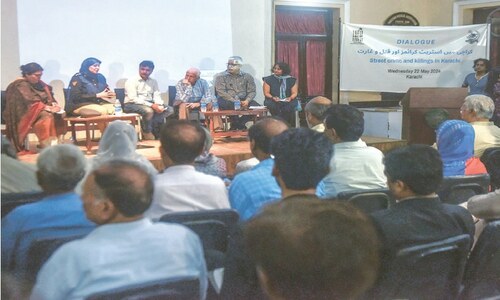KARACHI: The story of a lonely empress and a clerk from Agra jail had the audience enthralled during a session at the 8th Karachi Literature Festival on Sunday morning.
When Shrabani Basu started out her research for the book Victoria and Abdul, she learnt that after the queen’s death in 1901, her son had destroyed all the letters exchanged between Queen Victoria and her munshi, Abdul Karim.
“I started with a blank page. I worked in the archives of Windsor Castle, I read journals and I read his diaries. I had a lot of material for a book but there was a gap,” said Ms Basu, a journalist and historian based in London.
“I had found Abdul’s grave and his house in Agra but I had initially failed to find his descendants and learnt they had left after the Partition. The trail had gone cold because he had no children and that was one gap. I had read some of his letters, some of his writings in Urdu but I wanted his voice and I wanted to contact his descendants.
“So I went ahead and published the book. In every interview I kept saying I’m looking for his family and in the very second city, Bangalore, someone from the British Council contacted me and said there is a man here who claims that he is Abdul Karim’s grandson,” she added.
Her instinctive reaction, she said, was “yeah, and I’m Winston Churchill.”
Talking to the moderator, writer and commentator Victoria Schofield, Ms Basu explained that she never thought she’d find his family in Bangalore. “I thought I’d find them in Delhi or in Pakistan. Didn’t expect them to be in the south,” she said.
When they finally met, Ms Basu said, Abdul Karim’s grandson came to her with a small briefcase full of photographs.
“The photographs were of the family, which was lovely, but as a journalist I had to authenticate them,” she said, adding that when she asked him if there was anything else, he told her that his 80-year-old mother was still alive and she was daughter of Abdul Karim’s nephew.
Describing her meeting with the munshi’s direct relations, the author said: “She was lovely, she had all vivid memories of this house in Agra and she spoke with so perfect an English accent I couldn’t believe it… it was amazing.”
Through this meeting, Ms Basu said, she learnt that they had relatives in Karachi who had a diary written by the munshi himself.
When she reached Karachi, she learnt the family had not looked at the diary for more than a century and “it was like a treasure that had just fallen into my hands.
There is one line in the diary which I found poignant ‘This diary was important because the royal household wanted to suppress it’. I read notes where they said ‘oh he’s writing his memoirs we must see that they are not published’,” she said.
“He ends his diary like this…‘I should be well content if the perusal of this little work be attended with some interest or pleasure to the person in whose hands it may have chance to fall’ and it was me! It was finally like I was bringing his voice out,” she added.
Explaining how the Empress of India met Abdul Karim, Ms Basu said the munshi, who used to be a clerk at the Agra jail was sent to the queen as a gift (along with another clerk) on her Golden Jubilee in 1887 by the superintendent of the prison.
In one of her letters, she said, the queen had described the munshi as ‘tall and handsome’ and they instantly hit it off.
Ms Basu said in her research she learnt that Karim, who was very charming, taught the Queen about India, a country she was the Empress of but had never been to. “He taught her about Agra, the romance of the city, he also taught her Urdu and Hindi,” she added.
“Queen Victoria was a romantic person at heart and she loved the story of tomb being built for a queen because she had built one for her husband so it really appealed to her. Suddenly, she could feel the dust and heat of India…it was like Abdul Karim was bringing India closer to her,” explained the author.
The origins of the chicken curry were also discussed at the session. “Karim who had brought his spice box with him made the chicken curry for the queen and this is how Indian delicacies like chicken curry and daal became a regular in the royal kitchen,” she said.
At the end of the session at Beach Luxury’s Princess Hall, Munshi Abdul Karim’s great granddaughter walked in and introduced herself during the question and answer session. Her grandfather, she said, had been adopted by Mr Karim, who was his paternal uncle as he had no children of his own.
Ms Basu’s book is being made into a movie with the same title, Victoria and Abdul, starring Dame Judi Dench and Indian actor Ali Fazal as Munshi Abdul Karim. It is slated for release in September this year.
Published in Dawn, February 13th, 2017














































Dear visitor, the comments section is undergoing an overhaul and will return soon.